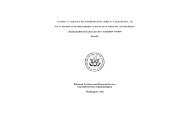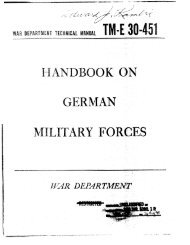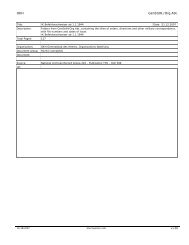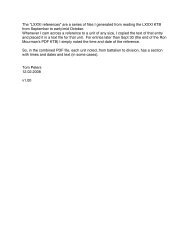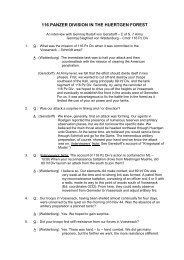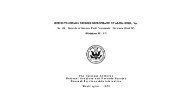2. Repairs to <strong>com</strong>munications, in support of the Germanarmies on the western and eastern fronts. This zone,<strong>com</strong>paring roughly with the zone of <strong>com</strong>munications andrear areas of the zone of operations, is the essentialpart of "Pront-OT" (see IB20).3« Strategic fortifications, underground construction offactories, supply depots and reduit installations. Notenough is known at present about this type of constructionfor anything but speculative discussion. It is, however,a virtual certainty that locations indicating OT and SSco-operation (see IIAb34) are locations of activities oftype 3.4» Civilian construction. This work overlaps, to <strong>com</strong>e extent,with type 1•b) Methods of Operation.49• "Stationgreinsatz" or Static Method of Operation.The OT employed two methods of operation, ihe mobile, asexemplified in Russia where it worked closely in the wake of theadvancing German Army, and the static method as exemplified in theWest. The Germans named these two methods Mobileinsatz andStationflreinsatz* Hiere is a certain temptation to associate thefirst method with Fritz TODT and the second with SHEER. TODT wasessentially a technician who thought in terms of large operationsand who possessed the great ability of adopting methods ofexecution to the nature of the operation. SPEER, on the otherhand, was forced by the economic situation of Germany to concentrateon mass production and standardised operative procedure. It would,therefore, be inaccurate to imply that the OT developedorganisationally according to one man's volition. Rather, itdeveloped as dictated by the pressure of war strategy, as expressedin economic and political terms.There are indications that the static or "semi-permanent" typeof operation was to have been continued and further developed afterthe war in the event of a German victory. The OT was organizednot only administratively but also operationally on the lines of amilitary organization. Before the German collapse in Prance, theOT in Germany could be somewhat <strong>com</strong>pared with the German Ersatzheer(Replacement Army). OTZ could be <strong>com</strong>pared with the administrativeoffices in BERLIN of the OKW (German Supreme Command),Oberbauleitungen, with the divisions of an army of occupation aralEGW, with theHQ in Paris. In the West, the Oberbauleitung was,with some isolated exceptions, the smallest operational sectorpossessing a full administrative HQ, just as division is thesmallest army unit with a General Staff HQ. The OBL consequentlyrepresented the "basic unit" as conceived in terms of the German"Einheitsprinzip" or standardisation of "basic units", leaving,however, the <strong>com</strong>position of higher units on a flexible basis, bygrouping "basic units" together, according to the requirementsof the task to be performed.Most of the OBLs in the West had a strength of from 10,000 to15,000 men, with indications that the TO/WE strength called forabout 16,000 men or that of a division. Apparently a self-containedbuilding organisation of the above size was considered to be thesmallest unit able to cope with the construction of large scaleinstallations, without at the same time, being unwieldy. In short,it was considered to be the most efficient unit. Specifica-tionsof raw material and of building parts had already beenstandardised, so had the costs of material and labour. If each OBLhad approximately the same man-power strength, therefore, it
obviously would also have the same productive capacity* If buildingactivity should increase appreciably in the sector of a particularOBL, its sector of operation was to have been decreased proportionately.Conversely, if building'activity were to decrease appreciably in aparticular OBL, its operational sector was to have been increasedproportionately. Inasmuch as building programmes were planned to extendover six month periods, such realignments would not have occurred toofrequently. Readjustments of OBL sectors for this reason did occurseveral times in NW France.Standardisation of specifications simplified the manufactureof parts and their assembly, as well as the draftings of plans andpreparation of estimates of material requirements. Standardisationof costs, beginning with the raw material and ending with thefinished parts used in construction or installation, simplified thebudgetary and financial administration. Standardisation of theproductive capacity of the OBLs would thus have immensely simplifiedestimates of tirae requirements over the entire Western sector, aswell as simplified the allotment of material and the problems ofpersonnel administration.Actually, things did not turn out as anticipated. OT'soperational efficiency deteriorated progressively in the West as thechances for a German victory began to dwindle. Specifically, thereasons were as follows; OT demands for manpower and material grewapace with Germany's territorial conquest, which, as the militarysituation became more unfavourable, necessitated the constructionof <strong>com</strong>prehensive defence systems. For a while OT had to <strong>com</strong>petewith German essential industries for material and manpower. Then,as Germany began to strain to keep up with Allied production, OThad to accept an economic policy which gave armament production apriority in respect to manpower, essential machinery and parts, andespecially transportation fuel. Later this priority enjoyed by the<strong>com</strong>petitors of the OT came to include a variety of accessory materials.This, in turn, meant not only greater control of the OT by variousReich agencies, but showed up in such small, yet effective, meansof work stoppage as delay in the shipping of new machine partsintended to replace worn out parts, lack of material and lack oftransportation owing to lack of fuel. As for manpower, it waslargely because of the refusal of the non-German workers to leavetheir native country for war jobs in Germany that OT, at least inthe West, managed to control the amount of manpower at its disposal.Allied air raids in the winter of 1943 and spring of 1944 were sucha demoralising factor that OT authorities had to arrange for masstransfers of personnel from Allied target areas, such as V sites, tothe <strong>com</strong>parative safety of the Atlantic Wall. These factors, <strong>com</strong>binedwith desertions and slow-downs began to affect output materially.The situation had be<strong>com</strong>e so desperate in fact that not only could theGermans not afford to discipline working personnel as long as theycould get any work out of them at all, but they even made arrangementswith the French authorities to employ French convicts who enjoyedthe dubious distinction of not even having served their full term.50. "Mobileinsatz" or Mobile Method of Operation.Mobileinsatz, as it operated in Russia worked as follows.Highly mobile and self-contained engineering units (bridging,harbour construction units, and others) followed closely in therear of the German advancing armies, and if the project was alarge one, were given their assignments as a result of OTliaison with the CG of Army or Army Group engineer units", andif the project was a small one as a result of indirect cooperationwith the Railway and Fortress Construction Engineerstaffs. The chiefs of these OT mobile units had <strong>com</strong>plete responsibilityfor the execution of their mission. In this connection,- 50
- Page 1 and 2:
IR5/f!lR-0T/5/4SHRnDBOOK OF THEDRcn
- Page 3 and 4:
GE R MAN YOT EINSATZGRUPPEN, AUTUMN
- Page 5 and 6:
TABLE OP CONTENTS(See also LIST OP
- Page 7 and 8:
4a. OrganizSferiy %f Sfciw t>T& ^ ^
- Page 9 and 10: Page35. "Current Organization" Eins
- Page 11 and 12: 155» Miscellaneous Deductions and
- Page 13 and 14: To-day PT is indispensable in any p
- Page 15 and 16: UNCLASS13* The two "basic types 6_
- Page 17 and 18: of control over its plans, which we
- Page 19 and 20: OT units was that of Bautrupps (Con
- Page 21 and 22: __ n be committed to work by order
- Page 23 and 24: 11. OT Construction Activities 1942
- Page 25 and 26: In case of Allied landings. In the
- Page 27 and 28: Factors militating against complete
- Page 29 and 30: 1* Rationalization^ on a nation wid
- Page 31 and 32: The project itself cannot be accept
- Page 33 and 34: areas within the Reich; (3) Einsatz
- Page 35 and 36: has the final responsibility for me
- Page 37 and 38: Matters of policy, as decided upon
- Page 39 and 40: with the Wehrmacht and with civil a
- Page 41 and 42: which do the actual work. This is o
- Page 43 and 44: adjacent construction sites are gro
- Page 45 and 46: Amt Bau-OTZ.The second ia the auton
- Page 47 and 48: are to be employed in tha execution
- Page 49 and 50: "Current Organization" Bauleitung (
- Page 51 and 52: Former Hauptabteilungen in OTZ have
- Page 53 and 54: (SS Liaison Officer) are the follow
- Page 55 and 56: y the Array for the construction of
- Page 57 and 58: fortresses stretch over its entire
- Page 59: (Eastern Wall) in April 1943* At on
- Page 63 and 64: Consequently ten lype A emplacement
- Page 65 and 66: at the expense of the "private comm
- Page 67 and 68: eside those of feeding and billetin
- Page 69 and 70: 57* Construction Programme, Materia
- Page 71 and 72: Italian firms arid the workers is c
- Page 73 and 74: "The large scale construction work
- Page 75 and 76: Diplom - Ingenieur "* Paul ANDORY,
- Page 77 and 78: Para. 7 ~ CompensationCompensation
- Page 79 and 80: Para* 16 - Text of the ContractThe
- Page 81 and 82: m tag » * u »"5. For ascertaining
- Page 83 and 84: - Delivery of Building MaterialThe
- Page 85 and 86: prior consent of the HU. Any assign
- Page 87 and 88: ecause of Allied propaganda and the
- Page 89 and 90: all replacement parts of machine we
- Page 91 and 92: served only as a general directive.
- Page 93 and 94: The transport organizations forking
- Page 95 and 96: outside the "boundaries of the Reic
- Page 97 and 98: d) Health and Medical Services77. M
- Page 99 and 100: tfhTheading "identifying scars or w
- Page 101 and 102: example, units of the Feldgendanaer
- Page 103 and 104: set up within the region of each Ar
- Page 105 and 106: Sc^al Festungspionier stab, (Portre
- Page 107 and 108: Refer at (Sub Unit) BII1 : Hochbau,
- Page 109 and 110: 2. Although the agencies are subord
- Page 111 and 112:
Emergency Measures1. In case of imm
- Page 113 and 114:
The interests of the OT firms as an
- Page 115 and 116:
of the OBL cuts across two or more
- Page 117 and 118:
The following captured document, he
- Page 119 and 120:
sche Nothilfe - Technical Tanarfien
- Page 121 and 122:
Chef de¥iflitfSItverwaltung, Haupt
- Page 123 and 124:
corresponding in area to the DHL's.
- Page 125 and 126:
ij Feldpoli^ei (commonly abbreviate
- Page 127 and 128:
erNSKK Verbindungsf&hrer des Transp
- Page 129 and 130:
, _ .-^^-^^-^sson of aDienstbuch (P
- Page 131 and 132:
ar T—all phases of OT operation.
- Page 133 and 134:
B. Classicioation of Personnela) Ge
- Page 135 and 136:
Control during working hours - unde
- Page 137 and 138:
ii . Betriebsftihrer (Finn Manager)
- Page 139 and 140:
vii,obhoer*ed. In the performance o
- Page 141 and 142:
were supposed to b« numbered conse
- Page 143 and 144:
In the autumn of 192*4, co-operatio
- Page 145 and 146:
with the French Betreuungftthrer me
- Page 147 and 148:
C; Training.129. Military Training.
- Page 149 and 150:
Russians also received this trainin
- Page 151 and 152:
NCO in OT - Dienst Unifom wearing M
- Page 153 and 154:
only distinguishing feature being t
- Page 155 and 156:
Dr. Pritz Todt Ehrennadel in Gold (
- Page 157 and 158:
ff f^f(b) * OT-Eigenes Personal (OT
- Page 159 and 160:
(v)the same*In December 1944, howev
- Page 161 and 162:
"IT "BT •CTGefcaltsgruppe I. 2 On
- Page 163 and 164:
untranslated and may be checked in
- Page 165 and 166:
Up to this point OT tariffs affecti
- Page 167 and 168:
a|t|jr^|| h l^fcers are paid accord
- Page 169 and 170:
ftfonthlv Einsatz Pav forMarried Wo
- Page 171 and 172:
IpecTaj regulations affecting OT pa
- Page 173 and 174:
or.- soid(Wehrsold) G. Gouv. Russ
- Page 175 and 176:
or negligence:time lost because of
- Page 177 and 178:
^rfrom service in the OT, the worke
- Page 179 and 180:
MANPOWERA. General Manpower Statist
- Page 181 and 182:
162. FirmenangehgrJRe (OT»-Firm Pe
- Page 183 and 184:
x» , ~«^«u u*^ of 1942, irregula
- Page 185 and 186:
The nuSKF'Wf s&lfeifrms 1 is estima
- Page 187 and 188:
equally urgent rSeP^^irniShing Germ
- Page 189 and 190:
Orders had come through to class ev
- Page 191 and 192:
The Gorman Feldkommandanturen who w
- Page 193 and 194:
Baltic Manpower179* Proportion and
- Page 195:
and to a lesser_. —ii«i4lfiU&»






